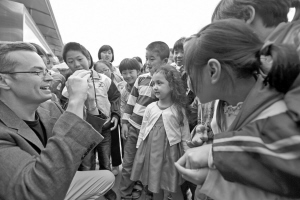 |
| 孩子们争相和这个可爱的混血小“助教”合影。 |
Chris Bugan先生来自美国,与宁波结缘逾十年。2002年,Chris在澳洲求学时对奉化籍同学周雪琴情有独钟,2005年毕业后就随爱人回乡定居创业,两人于2008年结婚,婚后育有3个女儿。创业至今,其公司已发展至270名员工,历年累计利税4800万元,对奉化经济做出了不小贡献。1年前,Chris夫妇为小孩上学方便而搬来宁波市区,入住香格里拉酒店公寓,也因此加入到酒店组织的系列公益活动。 My wife is a very open-minded person. She married and lives with a man from another part of the world, with a socio-economic background as different from her own as their native languages are from each other. She is a model of tolerance and acceptance. Now imagine a Chinese mother and father with two daughters. Hoping to provide the best future possible for their children, the parents send them abroad for their educa-tion. Both daughters return home with foreign in tow that speak hardly a word of Chinese. I imagine most Chinese parents would find this hard to accept. But my wife’s brother-in-law and I were taken into the family with open arms and open hearts. If my wife is open and accepting, then I can find no words sufficient to describe her par-ents. Make no mistake; cross-cultural relationships require a tremendous amount of hard work and patience. Had I married an American woman, I’d have no need decide whether to bestow Chinese or American names on my children, which passports they will hold, which religion or philosophy to teach them, or what language they should be educated in. Judging from conversations I’ve had with other foreign men married to Chinese, I’m not the only one who didn’t think about this beforehand. Yet for those willing to put forth the effort, the rewards are rich indeed. My four-year old daughter and I arrived at a boarding school on Siming Mountain just before lunchtime. I had been here before and knew what to expect, but this was my daughter’s first experience at any school other than her own. Curious students swarmed us mere moments after stepping off the bus. Some gathered to see what they perceived to be a foreign child and others to say hello and shake hands with us. I kept a careful eye on my daughter as she slowly warmed up to the group. She was here to help me teach an English class, so it was important for her to get comfortable being in the spotlight. In the classroom, my daughter helped make the students feel comfortable as I told them about American culture and practiced common English phrases with them. This particular school has difficultly finding qualified English teachers due to its remote location, so I volunteered my time as a native English speaker to help out. On this day, the students were able to see and interact with another child close to their own age that speaks both Chinese and English fluently. It is exciting to see the potential my children have to make a positive impact on society with their intimate knowledge of both cultures and languages. The possibilities seem limitless! And, of course, I now have my own per-sonal interpreter for my day-to-day needs. When I think about the day-to-day things that affect me most while living in China, two things immediately come to mind. The first is food. I still crave the occasional hamburger, but I’ve found my stomach has become far more accustomed to eating rice than french fries. Fortunately, Chinese fare is more diverse than I had ever previously imagined. From the spicy dishes of Hunan and Sichuan to the seafood dishes commonly found here in Ningbo and Shanghai, I’ve never lacked for variety. And the more ad-venturous I am, the more enjoyable it is. I savor the expressions I see on the faces of Chinese that spot me eating the raw, salty crab dish popular in Ningbo. The second thing is driving. My daily commute is an exercise in frustration for me and a source of new vocabulary for my children that they ought not to be learning. The combination of an increasing number of cars, inexperienced drivers, lack of respect for the rules of the road, and poor street design is a recipe for chaos. One simply cannot drive carefully enough here. For me, the problem becomes worse whenever I go back to visit the United States. I’ve found myself on more than on occasion using driving tactics on American streets that, while perfectly acceptable in China, could result in a road-rage incident worthy of the evening news. I can only hope the driving situation will improve in China over time. I look back at the past ten years of my life and I consider everything that has happened, the good and the bad. China has become so much a part of who I am that I cannot imagine my life any other way. Now I look forward to what the next ten years may bring. 译 文 妻子与我并肩作战,她是我的诤友。异国婚姻,双方从社会经济文化到语言均面临巨大差异,所幸我遇到她,开朗,且包容。我们在一起十年,婚后连年添丁。哗,三个女儿!从此麻烦不断。看,该取名了,中国名?美国名?该上户口了,持哪国护照好?该教育了,灌输何种意识形态?该上学了,中文学校?国际学校?……假如我当初娶了本国女子,也就少了这些困扰。如今我只会说,一分耕耘,一分收获。 大女儿安娜已经四岁了。这天午饭前,我带着她来到四明山小学,该校地处偏僻,是故难以招到英语教师,我自告奋勇前来帮忙。安娜中英文俱佳,带上她,因为我相信同龄人之间较能打成一片,而我等于有了贴心的私人翻译。我们跳下车。片刻后,孩子们涌上前来,好奇的目光在我们身上流连,打招呼,也有跟我们握手的。安娜很快融入孩子堆里。一堂课下来,我介绍美国文化,指导安娜和学生对话,气氛相当融洽。我发现女儿身上有股处事不惊的潜力,可以用自身的文化和语言优势对社会产生积极影响。振奋人心。 说到开放和包容,我钦佩岳父母的胸襟。老两口膝下无子,只得千金一对,早早送出去留学,又双双带回了洋女婿。对大多数中国父母而言,这是难以接受的,但是这个家庭却对我们敞开了心扉。 回头看看过去十年的生活,我细细思考所发生的一切,好的和坏的。 尽管我的胃仍不时渴望汉堡,但它已越来越中国化,更习惯于米饭而非炸薯条。中国菜系丰富,从川湘菜的香辣到江浙菜的海鲜,从来不缺选择。每当举案大嚼咸蟹时,我总留心同桌人的表情,看他们吃惊,有种恶作剧般的快感。马路上,越来越多的汽车和新手,行人依然不守规则……开车上下班,每天都是考验。不止一次,我发现自己业已习惯中国式驾驶规则,回到美国,一不小心就成“路霸”。 十年过去了,我感觉自己越来越像一个中国人。事到如今,我不能想象任何别处的生活。 期待中,未来十年慢慢展开画卷。 (《宁波通讯》供稿 翻译 林依臻颖)
|